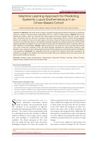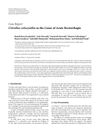
Autonomous robotic surgery is advancing but still requires human supervision for complex procedures.
 6 citations,
May 2022 in “Aging”
6 citations,
May 2022 in “Aging” Si Jun Zi Tang may slow aging by affecting specific cell signaling pathways.
 March 2024 in “International journal of life-sciences scientific research/SSR Institute of International Journal of Life Sciences”
March 2024 in “International journal of life-sciences scientific research/SSR Institute of International Journal of Life Sciences” PCOS has many symptoms, with high androgen levels being the most common.
 November 2023 in “Curēus”
November 2023 in “Curēus” Melatonin may help manage PCOS by improving insulin sensitivity, hormone balance, and mood.
 February 2024 in “Frontiers in physiology”
February 2024 in “Frontiers in physiology” Modifying certain signals in the body can help wounds heal without scars and regrow hair.
 December 2023 in “Frontiers in endocrinology”
December 2023 in “Frontiers in endocrinology” Excess androgens may cause PCOS, not just be a symptom.
 1 citations,
June 2023 in “Curēus”
1 citations,
June 2023 in “Curēus” PCOS affects nearly 25% of female medical and dental students, impacting their academic and social lives.
 1 citations,
February 2018 in “InTech eBooks”
1 citations,
February 2018 in “InTech eBooks” PCOS in lean women is a serious health condition with implications beyond fertility, affecting metabolism and increasing cardiovascular disease risk.
 4 citations,
February 2019 in “Biological Trace Element Research”
4 citations,
February 2019 in “Biological Trace Element Research” Chromium salts may help with insulin sensitivity in PCOS, but more research is needed to confirm their overall effectiveness and safety.
July 2023 in “Annals of African Medicine” Proper periodontal treatment with xenograft effectively manages aggressive periodontitis in SLE patients.

Doctors should consider Netherton syndrome in patients with chronic skin and hair issues to avoid misdiagnosis.
 February 2022 in “Obstetrics and gynaecology cases - reviews”
February 2022 in “Obstetrics and gynaecology cases - reviews” PCOS can cause unusual symptoms like late puberty and enlarged clitoris, making diagnosis difficult.
May 2020 in “International journal of dermatology and venereology” Hair matrix cysts are rare skin nodules with unique features, often needing surgical removal.
 1 citations,
July 2021 in “Curēus”
1 citations,
July 2021 in “Curēus” A child had a rare case of scarring hair loss with skin disease, which is hard to treat and stressful.
 15 citations,
January 2014 in “BioMed Research International”
15 citations,
January 2014 in “BioMed Research International” Heparin and protamine are promising in tissue repair and organ regeneration, including skin and hair.
 September 2023 in “Research Square (Research Square)”
September 2023 in “Research Square (Research Square)” TNC+ fibroblasts play a key role in skin inflammation by interacting with T cells.
 1 citations,
August 2023 in “Nature communications”
1 citations,
August 2023 in “Nature communications” Hdac1 and Hdac2 help maintain and protect the cells that control hair growth.
 3 citations,
July 2018 in “Cureus”
3 citations,
July 2018 in “Cureus” A breast cancer patient had lasting hair loss after chemotherapy, which improved with minoxidil treatment.
 114 citations,
March 2018 in “PLOS Medicine”
114 citations,
March 2018 in “PLOS Medicine” Women with PCOS are more than twice as likely to develop nonalcoholic fatty liver disease.
 13 citations,
January 2018 in “BioMed Research International”
13 citations,
January 2018 in “BioMed Research International” Scalp involvement is common in pemphigus and can lead to hair loss, with the severity of scalp lesions linked to overall disease severity.
 September 2023 in “Curēus”
September 2023 in “Curēus” Reproductive hormones play a crucial role in breast cancer development and treatment challenges.
 1 citations,
December 2022 in “Sultan Qaboos University medical journal”
1 citations,
December 2022 in “Sultan Qaboos University medical journal” The machine learning model accurately predicts Systemic Lupus Erythematosus in Omani patients.
 2 citations,
January 2019 in “Case Reports in Dermatology”
2 citations,
January 2019 in “Case Reports in Dermatology” A 66-year-old woman's thick scalp and hair loss were confirmed as lipedematous alopecia, a rare condition possibly influenced by genetics, with no effective treatment known.
 December 2024 in “Cureus”
December 2024 in “Cureus” Tirzepatide improved symptoms and hair regrowth in a man with folliculitis decalvans.

Gender-specific analysis could improve treatment for childhood systemic lupus erythematosus.
 January 2023 in “Annals of Dermatology”
January 2023 in “Annals of Dermatology” Men with a family history of hair loss on their mother's side are more likely to have female pattern hair loss.
 1 citations,
June 2021 in “Cureus”
1 citations,
June 2021 in “Cureus” A girl with hereditary chorea, likely Huntington's disease, had her condition worsened by lupus.
 9 citations,
January 2013 in “Case reports in emergency medicine”
9 citations,
January 2013 in “Case reports in emergency medicine” Eating Citrullus colocynthis can cause severe intestinal bleeding and damage.
 1 citations,
December 2020 in “Acta dermato-venereologica”
1 citations,
December 2020 in “Acta dermato-venereologica” Some scalp sores are linked to different inherited skin conditions.
 September 2023 in “Cureus”
September 2023 in “Cureus” Nails can reveal important health information about skin and body conditions.




























